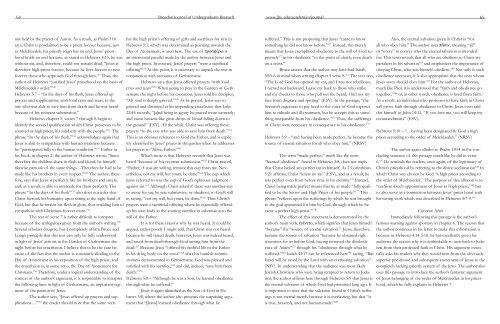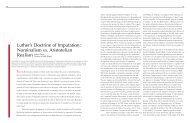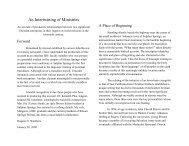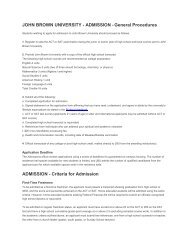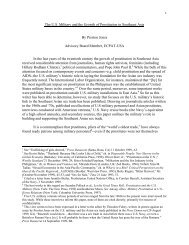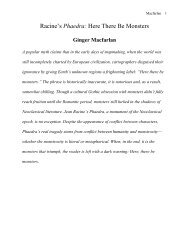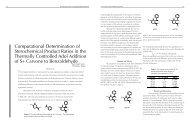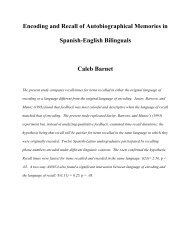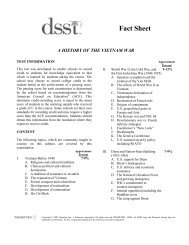Hebrews 4:14-5:10: Jesus, The Great High Priest Patton Shinall
Hebrews 4:14-5:10: Jesus, The Great High Priest Patton Shinall
Hebrews 4:14-5:10: Jesus, The Great High Priest Patton Shinall
- No tags were found...
You also want an ePaper? Increase the reach of your titles
YUMPU automatically turns print PDFs into web optimized ePapers that Google loves.
64 Broaden Journal of Undergraduate Reseachwww.jbu.edu/academics/journal65not held by the priests of Aaron. As a result, as Psalm 1<strong>10</strong>says, Christ is proclaimed to be a priest forever because, justas Melchizedek, his priestly reign has no end. <strong>Jesus</strong>’ priesthoodholds no end because, as stated in <strong>Hebrews</strong> 4:15, he waswithout sin, and, therefore, could not remain dead. “<strong>Jesus</strong> istherefore high priest forever, because he lives forever to saveforever those who approach God through him. <strong>14</strong>7 Thus, theauthor of <strong>Hebrews</strong> “justified <strong>Jesus</strong>’ priesthood on the basis ofMelchizedek’s order.” <strong>14</strong>8<strong>Hebrews</strong> 5:7 – “In the days of his flesh, <strong>Jesus</strong> offered upprayers and supplications, with loud cries and tears, to theone who was able to save him from death and he was heardbecause of his reverent submission.”<strong>Hebrews</strong> chapter 5, verses 7 through 8 begin toidentify the second qualification which Christ possesses to becounted as high priest, his solidarity with the people. <strong>14</strong>9 <strong>The</strong>phrase “In the days of his flesh,” 150 acknowledges again that<strong>Jesus</strong> is able to sympathize with human weakness becausehe “participated fully in the human condition.” 151 Earlier inhis book, in chapter 2, the author of <strong>Hebrews</strong> wrote, “Sincetherefore the children share in flesh and blood, he himselflikewise partook of the same things…<strong>The</strong>refore he had to bemade like his brothers in every respect.” 152 <strong>The</strong> author, therefore,says that <strong>Jesus</strong> is perfectly like his brothers and sisters,and, as a result, is able to intercede for them perfectly. <strong>The</strong>phrase “In the days of his flesh” 153 also does not infer thatChrist forsook his humanity upon sitting at the right hand ofGod, but that he retains his flesh in glory, thus enabling him tosympathize with Christians forever more. 154<strong>The</strong> rest of verse 7 is rather difficult to interpretbecause of the ambiguities given from the author’s writing. 155Several scholars disagree, but I completely affirm Bruce andLong’s principle that this text can only be fully understoodin light of <strong>Jesus</strong>’ actions in the Garden of Gethsemane thenight before his crucifixion. I believe this to be the case becauseof the fact that the author is constantly alluding to theDay of Atonement in his exposition of the high priest, andthe crucifixion is, in some ways, the Day of Atonement forChristians. 156 <strong>The</strong>refore, under a logical understanding of thecontext of the author’s argument, it is responsible to interpretthe following lines in light of Gethsemane, an important segmentof the passion of <strong>Jesus</strong>.<strong>The</strong> author says, “<strong>Jesus</strong> offered up prayers and supplications…”157 the reader should note that the same verbfor the high priest’s offering of gifts and sacrifices for sins in<strong>Hebrews</strong> 5:1, which was determined as pointing towards theDay of Atonement, is used here. <strong>The</strong> use of προσφέρω isan intentional parallel made by the author between <strong>Jesus</strong> andthe high priest. In essence, <strong>Jesus</strong>’ prayers “were a sacrificialoffering” 158 At this point, it is necessary to unpack the text inconjunction with accounts of Gethsemane.<strong>Hebrews</strong> says that <strong>Jesus</strong> offered prayers “with loudcries and tears” 159 When going to pray in the Garden of Gethsemanethe night before his execution, <strong>Jesus</strong> told his disciples,“My soul is deeply grieved.” 160 As he prayed, <strong>Jesus</strong> was sogrieved and dismayed at his impending crucifixion that Luke22:44 records, “[a]nd being in agony he prayed more earnestly;and sweat became like great drops of blood falling down tothe ground” (ESV). All the while, Christ was offering theseprayers “to the one who was able to save him from death.” 161This is an obvious reference to God the Father, and is explicitlyidentified by <strong>Jesus</strong>’ prayer in the garden when he addresseshis prayers to “Abba, Father.” 162What’s more is that <strong>Hebrews</strong> records that <strong>Jesus</strong> washeard “because of his reverent submission.” 163 Christ prayed,“Father, if you are willing, remove this cup from me. Nevertheless,not my will, but yours, be done” 164 <strong>The</strong> cup which<strong>Jesus</strong> referred to was the cup of God’s righteous judgmentagainst sin. 165 Although Christ asked if there was another wayto atone for sin, he was submissive, or obedient, to God’s willin saying, “not my will, but yours, be done.” 166 Thus Christ’sprayers were a sacrificial offering where he essentially offeredup his own body as the atoning sacrifice in submission to thewill of the Father.It is for these reasons why he was heard. It could beargued, rather poorly I might add, that Christ was not heardbecause he still tasted death, however, <strong>Jesus</strong> was indeed heard,and saved from death through God raising him from thedead. 167 Because <strong>Jesus</strong> “offered his faithful life to the Fatherin his dying body on the cross” 168 after his humble submissivenessdemonstrated in Gethsemane, God was pleased andsatisfied with his sacrifice, 169 and did, indeed, “save him fromdeath.” 170<strong>Hebrews</strong> 5:8 – “Although he was a Son, he learned obediencethrough what he suffered;”<strong>Jesus</strong> is again identified as the Son of God in <strong>Hebrews</strong>5:8, where the author also presents the surprising argumentthat “[<strong>Jesus</strong>] learned obedience through what hesuffered.” This is not proposing that <strong>Jesus</strong> “came to knowsomething he did not know before.” 171 Instead, this merelymeans that <strong>Jesus</strong> exemplified obedience to the will of God supremely172 in his obedience “to the point of death, even deathon a cross.”Bruce asserts that the author may have had Isaiah50:5-6 in mind when writing chapter 5 verse 8. 173 <strong>The</strong> text says,“<strong>The</strong> Lord God has opened my ear, and I was not rebellious;I turned not backward. I gave my back to those who strikeand my cheeks to those who pull out the beard; I hid not myface from disgrace and spitting” (ESV). In the passage, “theServant’s eagerness to pay heed to the voice of God exposeshim to ridicule and ill-treatment, but he accepts this as somethinginseparable from his obedience.” 174 Thus, the sufferingsof Christ were necessary in consequence to his obedience. 175<strong>Hebrews</strong> 5:9 – “and having been made perfect, he became thesource of eternal salvation for all who obey him,” (NRSV)<strong>The</strong> term “made perfect,” much like the term“learned obedience” found in <strong>Hebrews</strong> 5:8, does not implythat Christ lacked any perfection in himself. As 2 Corinthians5:21 affirms, Christ “knew no sin” (ESV), and as a result, hewas perfect even from before time in his eternity. 176 Instead,Christ being made perfect means that he as made “fully qualifiedto be the Savior and <strong>High</strong> <strong>Priest</strong> of his people.” 177 Thisphrase “reflects upon the sufferings by which he was broughtto the goal appointed for him by God, through which he becamea perfect high priest.” 178<strong>The</strong> effect of this statement is demonstrated by theauthor’s main verb, ἐγένετο, which signifies that <strong>Jesus</strong> himself“became” the “source of eternal salvation.” <strong>Jesus</strong>, therefore,became the source of salvation “because he obtained righteousnessfor us before God, having removed the disobedienceof Adam” 179 through his “obedience through what hesuffered.” 180 Isaiah 45:17 can be referenced here 181 saying, “ButIsrael will be saved by the Lord with an everlasting salvation”(NIV). In understanding that the audience was most likelyJewish Christians who were being tempted to return to Judaism,the author affirms here through <strong>Hebrews</strong> 5:9 that <strong>Jesus</strong> isthe eternal salvation of which God had promised long ago. Itis important to note that the salvation found in Christ’s sufferingsis not eternal merely because it is everlasting, but that “itis true, heavenly, and not human-made.” 182Also, the eternal salvation given in Christ is “forall who obey him.” <strong>The</strong> author uses πᾶσιν, meaning “all”or “every” to convey who the eternal salvation is intendedfor. This term reveals that all who are obedient to Christ arepartakers in his salvation 183 and emphasizes the importance ofobeying Christ, who was himself obedient. 184 Not only is suchobedience necessary, it is also appropriate that the ones whom<strong>Jesus</strong> saves should obey him. 185 For the author of <strong>Hebrews</strong>,much like Paul, it is understood that “faith and obedience gotogether,” 186 or, in other words, obedience is bred from faith.As a result, an individual who professes to have faith in Christwill prove faith through obedience to Christ. <strong>Jesus</strong> even saidthis himself in John <strong>14</strong>:15, “If you love me, you will keep mycommandments” (ESV).<strong>Hebrews</strong> 5:<strong>10</strong> – “…having been designated by God a highpriest according to the order of Melchizedek.” (NRSV)<strong>The</strong> author again alludes to Psalm 1<strong>10</strong>:4 in the concludingsentence of this passage much like he did in verse6. 187 He reminds the readers, once again, of the legitimacy ofChrist’s priesthood by referring to the divine acclamation 188 bywhich Christ was chosen by God “a high priest according tothe order of Melchizedek.” <strong>The</strong> purpose of this allusion is to“reaffirm God’s appointment of <strong>Jesus</strong> as <strong>High</strong> priest,” 189 butto also serve as a connection between <strong>Jesus</strong>’ priest hood withhis saving work which was described in <strong>Hebrews</strong> 5:7-9. 190Context: AfterImmediately following this passage is the author’sfamous warning against apostasy in chapter 6. <strong>The</strong> reason thatthe author continues in his letter to make this exhortation isbecause in <strong>Hebrews</strong> 4:<strong>14</strong>-5:<strong>10</strong>, he has excellently given hisaudience the reason why it is unthinkable to turn back to Judaismfrom their professed faith in Christ. His argument essentiallyasks his readers why they would turn from the obviouslysuperior priesthood and subsequent atonement of <strong>Jesus</strong> to thecompletely lacking priestly system of the Jews. <strong>The</strong> author alsouses this passage to introduce the author’s fantastic argumentof <strong>Jesus</strong> belonging of the order of Melchizedek in his priesthood,which he fully explains in <strong>Hebrews</strong> 7.


